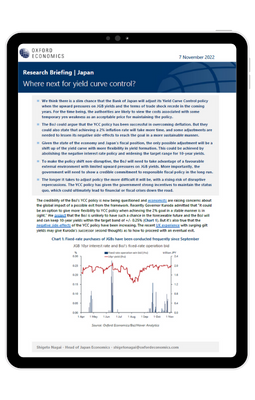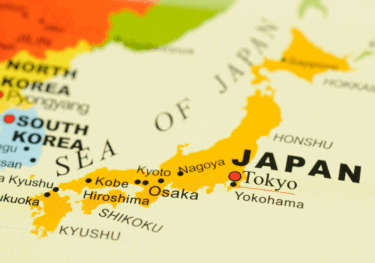Where next for BoJ’s yield curve control?

The credibility of the BoJ’s YCC policy is now being questioned and economists are raising concerns about the global impact of a possible exit from the framework. Recently Governor Kuroda admitted that “it could be an option to give more flexibility to YCC policy when achieving the 2% goal in a stable manner is in sight.” We project that the BoJ is unlikely to have such a chance in the foreseeable future and the BoJ will and can keep 10-year yields within the target band of +/- 0.25%. But it’s also true that the negative side-effects of the YCC policy have been increasing. The recent UK experience with surging gilt yields may give Kuroda’s successor second thoughts as to how to proceed with an eventual exit.
What you will learn:
- We think there is a slim chance that the Bank of Japan will adjust its Yield Curve Control policy when the upward pressures on JGB yields and the terms of trade shock recede in the coming years.
- Given the state of the economy and Japan’s fiscal position, the only possible adjustment will be a shift up of the yield curve with more flexibility in yield formation. This could be achieved by abolishing the negative interest rate policy and widening the target range for 10-year yields.
- The longer it takes to adjust policy the more difficult it will be, with a rising risk of disruptive repercussions. The YCC policy has given the government strong incentives to maintain the status quo, which could ultimately lead to financial or fiscal crises down the road.
Tags:
Related Resouces

Post
Tariffs and Politics Leave the BoJ Powerless in Japan
The Bank of Japan kept its policy rate at 0.5% at its July meeting. We continue to think the BoJ will exercise caution on rate hikes despite still-high inflation and a recent trade deal with the US.
Find Out More
Post
US-Japan Trade Deal Fails to Shift Japan’s Growth Outlook
We estimate that the US's effective tariff rate on Japanese products is around 17%, in line with our baseline assumption. Lower tariffs on autos are a positive, given the sector's significant contribution to the economy and its broad domestic supporting base
Find Out More
Post
Japan’s Rising Political Instability Will Undermine Fiscal Discipline
The ruling Liberal Democratic party (LDP) and its partner Komeito lost their majority in Japan's upper house elections on July 20. Although Prime Minister Shigeru Ishiba will likely stay to avoid political gridlock, especially to complete tariff negotiations with the US, the political situation has become fluid and could lead to a leadership change or the reshuffling of the coalition.
Find Out More